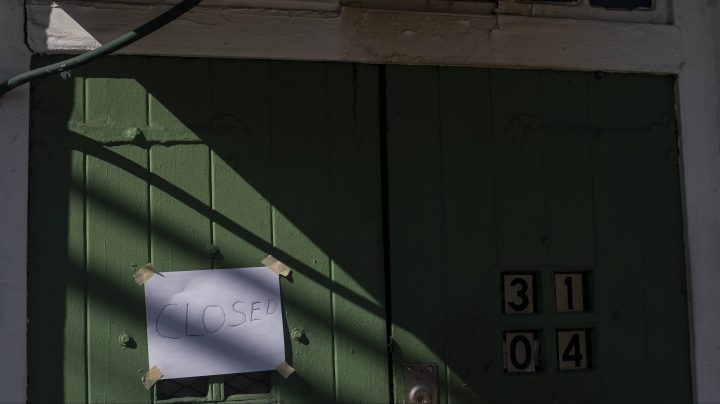
An unemployed bartender’s search for work and stability
An unemployed bartender’s search for work and stability

There were about 2 million fewer jobs in bars and restaurants in October than there were before the pandemic. That means a lot of unemployed bartenders and waitstaff are competing for the jobs that remain. Neil Cairns, one of the 10 people we’ve been following in our series “The United States of Work,” is one of them.
The Game Knight Lounge, the bar where Cairns used to work, closed temporarily in the spring, reopened in the summer, then shut its doors permanently in August. Since then, Cairns has been unemployed. The following is an edited transcript of his conversation with “Marketplace” host Kai Ryssdal about searching for work in the pandemic economy.
Kai Ryssdal: How are you, first of all?
Neil Cairns: You know, I’m doing all right, all things considered. Right now I am applying for jobs, still looking for work. I’ve done a couple of interviews, but the interviews have been kind of intense. I’ve heard from a few different people they’ve had, you know, more than 100 applicants to a single job. There’s just a lot of people applying for not a lot of jobs.
Ryssdal: So what are you gonna do, Neil?
Cairns: That’s a really good question. You know, my landlord’s been working with us on things like rent and stuff like that. We’ve actually been paying half-rent for a few months now. But, you know, he’s also made it clear that come January, we need to be paying full rent or he needs to find somebody else to rent to. So I really, I really don’t know what I’m gonna do coming up here.
Ryssdal: I’m sure you’re paying attention to the eviction moratorium that expires at the end of the year, yeah?
Cairns: Yeah. Yeah, absolutely. That’s definitely looming quickly.
Ryssdal: Are you getting unemployment benefits? I remember at some point, we had talked to you and it was really tough for you to actually even get those benefits that you were due. Have you been able to fix it?
Cairns: So, yes. Recently, I did finally start receiving regular unemployment. I’ve gotten the back pay for it. So that has finally come together. I am actually getting $152 a week for unemployment.
Ryssdal: I’m sorry, $152 a week? That’s not gonna cover probably even half-rent, right?
Cairns: No, not remotely. No, that’s — you know, there were nights I made that much as a bartender.
Ryssdal: So this is, this is kind of a sideways question, but go with me here. You know, we talk on Marketplace a lot about uncertainty in business and how that affects what businesses do. It seems to me that this is uncertainty on an extremely personal level. You don’t know where you’re going to be living in January, you don’t know where money’s coming from. There are millions of people in this economy like you. I’m amazed you have the wherewithal to get on the phone and talk to me.
Cairns: Well, you know, I think it’s important that people know that this is going on. I’m certainly not alone in it. I mean, there are millions of people across the country who are going through exactly the same situation as me and plenty who’ve got it even harder.
Ryssdal: Do you feel — do you feel like you’ve been forgotten?
Cairns: I’m not sure I was ever noticed in the first place in this economy. I think we’ve been trying to do a whole lot of different, like, kind of half-measures to take care of this pandemic, and a lot of that has ended up with people like me, yeah, I think, being forgotten.
Ryssdal: What does a solution look like to you? I mean, if Congress came out today and said, “We’ve got $3 trillion,” how would you want them to spend it?
Cairns: I think they need to really, fully, properly lock down the country and pay people to stay the heck home. You know, a few weeks of a real, proper lockdown for any nonessential person, where people don’t need to worry about making ends meet, and being we’d have a much simpler problem to deal with.
Ryssdal: So this is kind of a personal question. But are you sleeping well at night?
Cairns: No, I don’t go to sleep. I wake up a lot. I have really, like, Disneyesque nightmares about needing to get a job. Like literally just having people in my dreams tell me, “You’re worried because you need to get a job.” Like, I don’t even have the energy to be creative right now.
Ryssdal: It doesn’t need a whole lot of analysis. It just tells you what it’s all about. I don’t, I don’t want to end on a downer, Neil, especially after your Disneyesque dreams. But how much longer can you do this?
Cairns: I’d say about a month. At that point, you know, we don’t really have a fallback location to go to if we end up out of a house. I don’t own a vehicle right now. So yeah, I would say that I have a need to have some kind of, of income coming in the next few weeks, or I really don’t know, you know, what’s next for me.
There’s a lot happening in the world. Through it all, Marketplace is here for you.
You rely on Marketplace to break down the world’s events and tell you how it affects you in a fact-based, approachable way. We rely on your financial support to keep making that possible.
Your donation today powers the independent journalism that you rely on. For just $5/month, you can help sustain Marketplace so we can keep reporting on the things that matter to you.












